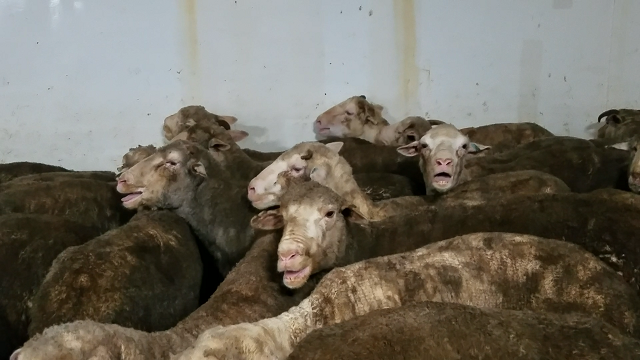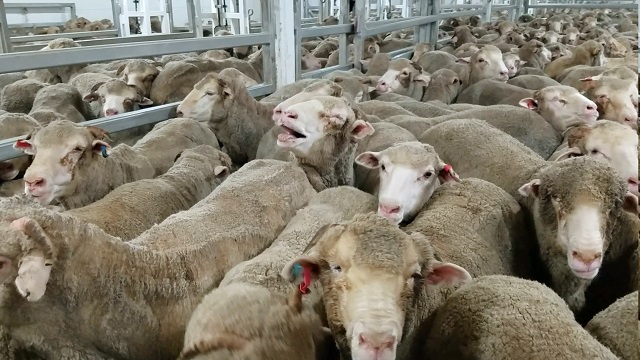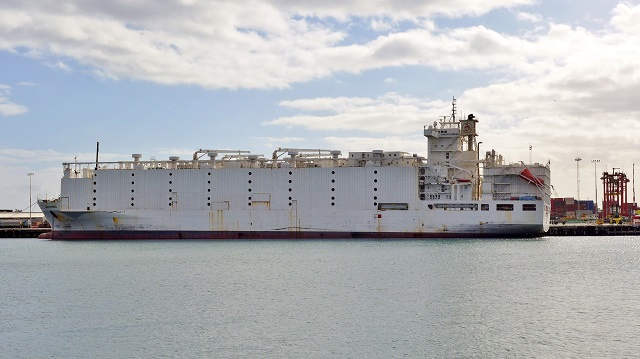Thousands of Sheep Died and Someone Filmed It
It started out as a routine voyage. The Awassi Express sailed from Australia's winter to the Middle Eastern summer in the lead up to the annual Muslim festival of sacrifice. But something went wrong. Approximately 2,400 sheep didn't make it to port. They died of heat stress, some trapped in a bog of excrement, and someone on board filmed it.
The Awassi Express
The film shows images on board an August 2017 voyage for the exporter Emanuel Exports, and it has become the centerpiece of an investigative media report on the 60 Minutes program, aired on Sunday night. Throughout the program footage from five separate voyages is aired depicting thousands of sheep suffering severe heat stress; sheep caked in melted feces and urine; injured and sick animals left to die slowly; decomposed bodies left in pens with living sheep and pregnant ewes giving birth and their lambs dying. At least one sheep that’s clearly alive is shown being thrown overboard.

Animal welfare organization Animals Australia spokeswoman Lyn White says: “The vision is shocking - but what is equally shocking is that each of these shipments was approved by the Australian government.”
Not the First Time
It's not the first time that 60 Minutes has been involved with controversial allegations made against the industry. Dr Tony Hill, a veterinarian working for Emanuel Exports, claimed over a decade ago on the program that he was asked to falsify mortality figures on the Al Khaleej in 2001. Up to 2,000 sheep died on the voyage but only 105 deaths were officially reported.
The following year, on the Al Shuwaikh almost 6,000 sheep died of salmonella and heat stress, and on the Corriedale Express another 6,000 died when the ventilation failed. Then, in 2003, the program highlighted the high mortality event that occurred on the Cormo Express. Nearly 6,000 sheep died, many from heat stress.
The 60 Minutes program has also broadcast footage of the treatment of animals once they reach abattoirs in the Middle East, as have other media outlets. Live cattle exports to three abattoirs in Vietnam were suspended in 2016 after Animals Australia footage was aired on ABC's The 7.30 Report. The footage depicted cattle being killed using a sledgehammer. Five years earlier, the then-Labor government temporarily banned exports to Indonesia after footage aired on the Four Corners program showing animals being kicked and whipped by abattoir workers.
Industry Priorities
On taking up position as Chairman of the Australian Livestock Exporters' Council in 2014, former politician Hon. Simon Crean told ABC Rural that his government had made a wrong decision in shutting down live exports to Indonesia in 2011 after the footage was aired. Crean, who has held portfolios including trade, agriculture and regional development, is reported to have said: “Given I was part of a government that led to the closure of the trade, I also felt something of an obligation to the industry to try and do something to not just help get it back on its feet, but to continue that trajectory, that growth path, but a sustainable growth path.” Crean is reported to have said that restoring public confidence in the live exports by improving animal welfare was a priority for the industry, as was developing new markets for Australian sheep and cattle.
Unique Risks
Now, faced with the latest 60 Minutes footage, the Council said it was highly distressing and unacceptable to the industry, livestock producers and the community. But, says the Council, unique risks were encountered. The Awassi Express' first port of call was changed from Kuwait to Doha, Qatar, due to the blacklisting of Qatar by other Gulf Cooperation Council at the time. Kuwait experiences a drier heat which presents fewer heat-stress risks for sheep when a vessel is carrying a full consignment.
The Council notes that 3.79 percent of the total consignment of 63,804 head died on the voyage. In 2017, 12,377 sheep died in transit out of a total 1.74 million head exported from Australia, a mortality rate of 0.71 percent. Millions of dollars are invested each year by exporters, and last year, the industry's service provider LiveCorp invested A$1.4 million for welfare programs. Recent research has include an extensive literature review of bedding management and air quality and on-going research and validation of heat stress management models.
An Apology
Emanuel Exports’ Director Nicholas Daws said the footage televised by 60 Minutes is simply devastating and Emanuel Exports apologizes to farmers and the broader community for these absolutely unacceptable outcomes.
Government Report
The Department of Agriculture and Water Resources, the government department responsible for the animals' welfare, released it's investigation report into the Awassi Express incident earlier this month. The government investigates “reportable mortality incidents” where voyage mortality rates exceeding two percent - in the case of the Awassi Express voyage in question: if more than 1,276 animals die.
The investigators noted that in the five years before the Awassi Express incident there have been three other reportable mortality incidents for sheep exported to the Middle East. These voyages were all undertaken during the northern hemisphere summer, and heat stress was a contributing factor in all cases.
Over the past eight years, there have been eight high mortality incidents on voyages to the Middle East, including an Emanuel Exports voyage on the Al Messilah in 2016. 10 years of shipboard performance reports indicate that the routine mortality rate on voyages to the Middle East is greater in summer than other times of the year.
The Awassi Express investigation found that the sheep were prepared and transported in accordance with all regulations. This includes stocking density regulations which call, for example, for 0.31 square meters (3.3 square feet) for a 47 kilogram (104 pound) sheep. The following consignment of sheep to the Middle East using the same vessel recorded a mortality rate of 0.52 percent after a Department requirement for Emanuel Exports to reduce stocking density by 10 percent. The company continues to work with the Department and has boosted ventilation on the vessel and negotiated for Kuwait to once again be the first port of call for shipments to the region.
Additionally, the Council now says it will present a range of steps to the Department to strengthen transparency and reporting including:
• Investigating the reduction in stocking densities for sheep to the Arabian Gulf during high risk periods
• More effective monitoring and recording of onboard conditions
• Additional independent onboard personnel and auditing of livestock infrastructure including ventilation and drainage
• Strengthening the policies and enforcement of the heat stress risk assessment model
• Building greater scientific integrity into the way the well-being of livestock onboard is monitored.
Heat Stress
Veterinarian Dr Sue Foster, spokeswoman for Vets Against Live Export, says the Department's accepted heat stress thresholds for sheep have remained unchanged since 2006 despite industry funded scientific studies that show that they are too high. Additionally, the space allowance for sheep on a live export ship has not changed since 1983. She says, “It doesn't matter whether a sheep gets 0.31 square meters or 0.35 square meters. They still wont be able to get to food or water, and they still wont be able to lie down let alone cope with heat stress.”
On the Awassi Express, the sheep experienced moderate to severe heat stress from Day 5 to Day 21. “The graphs show that wet bulb temperatures were essentially greater than 31ºC (87.8ºF) from Day 14 to Day 20 and on Day 18 (ie after 13 days of continuous heat stress), the wet bulb temperature reached a shocking 37ºC (98.6ºF),” says Foster. “If only one sheep traveled on this ship that had wet bulb temperatures of up to 37 degrees, then it could have died. No amount of space is going to save sheep when the temperatures are simply above their physiologic coping limits. The only thing that would save them is air conditioning, and ventilators pushing hot humid air are not air conditioners.”
Most of the sheep on the Awassi Express suffered the heat and survived. Vets Against Live Export has always maintained that a major failing of the law relating to live export, unlike Australian domestic law, is that it doesn't take into account of the suffering of the animals involved; it only counts dead bodies.

Special Conditions
After receiving the Awassi Express footage, the Department of Agriculture and Water Resources issued a statement saying the footage shows conditions that are deplorable and unacceptable. It is taking immediate action to add an independent department veterinarian to an upcoming voyage of the Awassi Express to the Middle East. This veterinarian will monitor and record the health and welfare of all animals on board, send back daily reports and images and will also be able to issue directions on the vessel to ensure the welfare of the sheep. Stocking density will be reduced by 17.5 percent.
However, Inspectors from the Australian Maritime Safety Authority spent hours inspecting the Awassi Express after it docked in Fremantle, Western Australia, on Sunday. AMSA has advised the master and ship operator that they will have to arrange a third party air flow verification report to prove compliance with air flow standards before the vessel will be authorized to depart Australia.
WARNING GRAPHIC CONTENT:
Some viewers may find the 60 Minutes program below disturbing.
The 60 Minutes program part 1:

that matters most
Get the latest maritime news delivered to your inbox daily.
The 60 Minutes program part 2:

